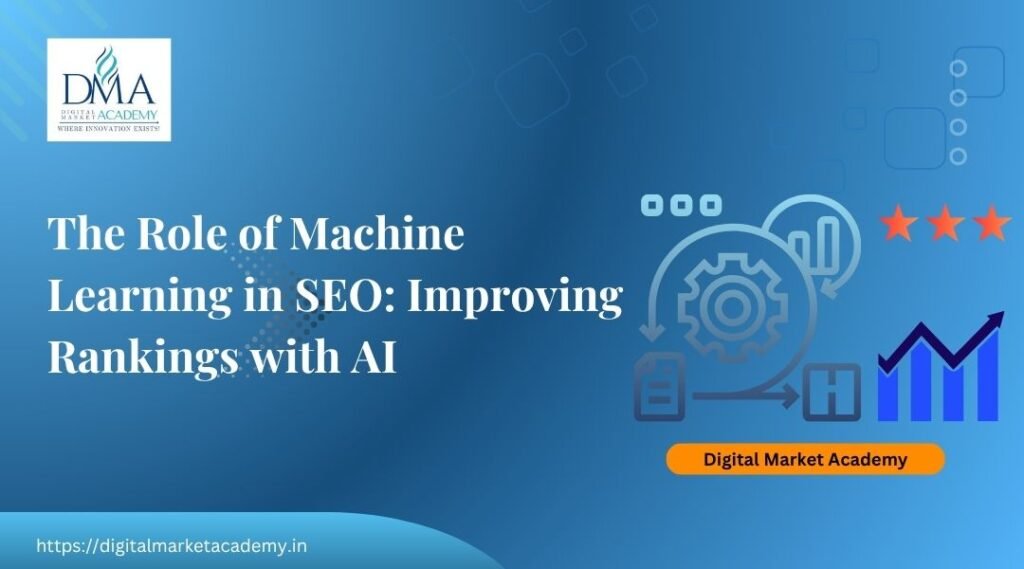Understanding the Power of Machine Learning in SEO
Introduction
Machine learning in SEO is no longer just a futuristic concept; it’s a reality that’s changing how digital marketers approach website optimization. With the help of AI algorithms, machine learning can analyze data patterns, predict search trends, and optimize content more efficiently than ever before. In 2025, the integration of AI-powered systems into SEO workflows is essential to stay competitive in a constantly evolving digital landscape. But how exactly does machine learning work in SEO, and what does it mean for your website’s rankings?
As search engines become more intelligent, the role of machine learning in SEO has expanded significantly. Gone are the days of basic keyword targeting and simple backlinks; today’s SEO strategies are powered by AI and machine learning algorithms that assess, predict, and adjust in real-time. In this blog, we’ll explore how machine learning is improving SEO rankings and how you can leverage AI tools to automate tasks, optimize content, and enhance user engagement for better search visibility.
How Machine Learning Works in SEO
Machine learning, a subset of artificial intelligence (AI), uses algorithms that can analyze large datasets, learn from them, and make predictions or decisions without being explicitly programmed. In the context of SEO, machine learning plays a vital role by helping search engines like Google analyze user behavior, understand search intent, and assess the relevance of content.
Search engines such as Google use machine learning algorithms like RankBrain, BERT, and MUM to provide more accurate search results. RankBrain focuses on understanding the meaning behind user queries, whereas BERT (Bidirectional Encoder Representations from Transformers) helps search engines better understand the nuances of language, even accounting for synonyms and context.
Furthermore, MUM (Multitask Unified Model), a newer machine learning model by Google, allows the search engine to analyze content across different media (text, video, images) and deliver more comprehensive results. These algorithms improve SEO by providing results that are more aligned with a user’s search intent rather than relying solely on keywords.
Machine learning also plays a role in content optimization. For example, AI tools powered by machine learning can suggest improvements to content by analyzing patterns in high-ranking content, identifying keyword gaps, and predicting which content will be successful.
Benefits of Using Machine Learning in SEO
Machine learning in SEO brings numerous advantages to digital marketers. Here are some of the key benefits:
- Improved Search Engine Rankings
Machine learning is one of the primary reasons for the shift toward AI-driven search engines. By continuously analyzing factors like user engagement, dwell time, and click-through rates, machine learning helps search engines identify the best content to serve for any given query. This results in improved search rankings for pages that provide valuable content and meet user intent. - Enhanced User Experience
One of the main goals of search engines is to provide the best possible user experience. Machine learning enables search engines to assess user behavior such as bounce rate, time on page, and clicks, which are indicators of content quality and relevance. Content that offers an improved user experience (UX) is ranked higher, reinforcing the importance of creating engaging, user-friendly websites. - Automation of Time-Consuming Tasks
Machine learning tools can automate various SEO tasks, such as keyword research, on-page SEO, and even content creation. This frees up valuable time for digital marketers to focus on higher-level strategies. AI-powered tools like Surfer SEO, MarketMuse, and ClearScope can analyze SERPs, track keyword performance, and offer insights into content optimization, all while reducing human effort. - Enhanced Content Relevance and Optimization
Machine learning can automatically adjust content for SEO by analyzing what works for top-ranking pages and suggesting relevant keywords, topics, and content structures. This means marketers no longer need to manually review hundreds of pages; machine learning tools will do it for them, allowing for quicker adjustments and better results. - Personalized Search Results
With machine learning, search engines can offer more personalized results. By studying past behavior and preferences, machine learning algorithms tailor search results to individual users. This means that SEO strategies now need to take user personalization into account, offering unique, high-quality content that directly addresses users’ needs.
How to Leverage Machine Learning for SEO in 2025
- Adopt AI-Powered SEO Tools
One of the best ways to implement machine learning in SEO is by adopting AI-powered tools that can help automate and optimize tasks. Tools like Surfer SEO, Clearscope, and MarketMuse leverage machine learning to suggest optimizations based on the most relevant ranking factors. They analyze search intent, recommend keywords, and assess content quality, making it easier to create content that ranks well. - Predictive Analytics for SEO
Machine learning can help SEO professionals predict future search trends and ranking fluctuations. Predictive analytics tools powered by AI analyze historical data to forecast how search trends will evolve and what keywords will become more important. By using this data, you can stay ahead of competitors and adjust your SEO strategy accordingly. - Use AI Chatbots for Better Engagement
AI chatbots are increasingly being used in SEO to improve user experience. By implementing machine learning algorithms, these bots can understand user queries and direct them to the most relevant content on your website. This leads to higher engagement and improved SEO rankings due to better user interaction and extended time on site. - Machine Learning for Link Building
Building high-quality backlinks is still a fundamental part of SEO. Machine learning can help analyze backlinks to determine their quality and predict which links will have the most impact on rankings. AI-powered tools like Ahrefs and Moz provide insights into potential link-building opportunities by assessing backlinks from competitors and recommending the best link-building strategies. - Content Personalization and Dynamic Optimization
Machine learning can help you optimize your content in real-time by identifying which content performs best and dynamically adjusting it for better performance. This could mean adjusting keyword density, adding new sections based on user interest, or even modifying the content’s structure to increase readability and engagement.
As machine learning continues to reshape how search engines interpret content, it’s crucial to understand where this technology is heading. For a broader view on how AI-powered SEO tools, including those driven by machine learning, are set to transform the entire SEO ecosystem, check out our in-depth guide: AI-Powered SEO Automation Tools: The Future of SEO in 2025.
The Future of SEO: Machine Learning and AI in 2025
The future of SEO will be heavily influenced by machine learning and artificial intelligence. As search engines like Google continue to evolve, they will rely more on machine learning to understand user intent, assess content quality, and predict ranking behavior.
- Content Optimization Will Be More Automated
In 2025, SEO will be driven by more sophisticated machine learning models that automate much of the optimization process. These tools will be able to automatically optimize content for ranking factors such as backlinks, keyword usage, and content relevance, leaving digital marketers to focus on strategy. - More Focus on User Intent and Personalization
The next generation of SEO will focus even more on understanding user intent. Machine learning will help search engines better understand the nuances of queries and deliver more personalized results based on an individual’s search history and behavior. This means content needs to be highly personalized and tailored to the specific needs of users.
Increased Use of Voice Search and AI
With the rise of voice search, machine learning will play a major role in optimizing content for voice queries. AI tools will help SEO professionals create content that answers questions in a conversational tone, improving visibility on voice search platforms like Google Assistant and Siri.
Frequently Asked Questions (FAQs)
Machine learning algorithms analyze user behavior and content performance to improve ranking factors like relevance, engagement, and quality. By understanding search intent and content context, these algorithms ensure that search engines deliver the most appropriate content, leading to better rankings.
While AI tools can automate many SEO tasks, such as keyword research and content optimization, human SEO experts are still necessary for strategic planning, content creation, and adapting to new trends. AI tools are best used as supplements to human expertise.
Some popular AI tools for SEO include Surfer SEO, MarketMuse, Clearscope, and Ahrefs. These tools use machine learning to analyze search trends, optimize content, and improve SEO performance.
AI-powered tools like chatbots, predictive analytics, and content personalization improve user experience by providing relevant content, answering user queries, and guiding visitors through your website more effectively.
Voice search is becoming increasingly important for SEO. Machine learning helps optimize content for voice search by ensuring that it answers specific questions in a conversational tone. This increases visibility on voice platforms like Google Assistant and Siri.
Conclusion:
Machine learning in SEO is quickly becoming an indispensable tool for digital marketers. With the ability to automate tasks, predict trends, and continuously optimize content, machine learning is transforming the way SEO is approached. By leveraging AI-powered tools, businesses can enhance their search engine rankings, improve user engagement, and stay ahead of the competition.
In 2025, SEO professionals who embrace machine learning and AI will have a significant advantage. The key is to stay ahead of the curve, adopt AI tools, and continually adapt SEO strategies to meet the ever-changing demands of both search engines and users. Digital Market Academy in Bangalore is one of the leading institutions offering comprehensive training in SEO, AI-powered tools, and machine learning. Their hands-on approach to teaching ensures that students not only understand the theory but also gain practical knowledge that can be applied directly to improve SEO efforts.
For anyone looking to enhance their SEO skills and stay competitive in 2025, enrolling in Digital Market Academy’s courses will provide you with the cutting-edge skills needed to master the intersection of SEO and machine learning. Whether you are just starting or looking to advance your career, DMA’s specialized programs can help you gain expertise and stay ahead of the competition in the evolving world of SEO.


Rajesh Menon is a leading digital marketing trainer and strategist based in Bangalore, with over 15 years of experience in SEO, advertising, and digital growth planning. As the Founder and CEO of Digital Market Academy, he is known not just for his ability to teach, but for his visionary thinking and deep strategic insight.
At the academy’s Kasturinagar center, Menon leads classroom training programs and digital marketing boot camps. He also conducts on-campus sessions at colleges for undergraduate and postgraduate students, and provides digital enablement workshops for MSMEs and startups. His approach blends practical execution with long-term strategy, making him a trusted mentor for aspiring marketers and small business owners alike.
Rajesh writes regularly on the Digital Market Academy blog, and also shares expert content on Medium and LinkedIn, where his work is followed by both learners and industry peers.
You can find links to his Medium and LinkedIn profiles in the author box below.




